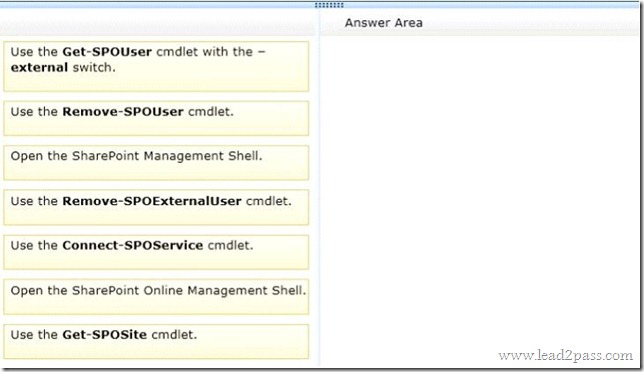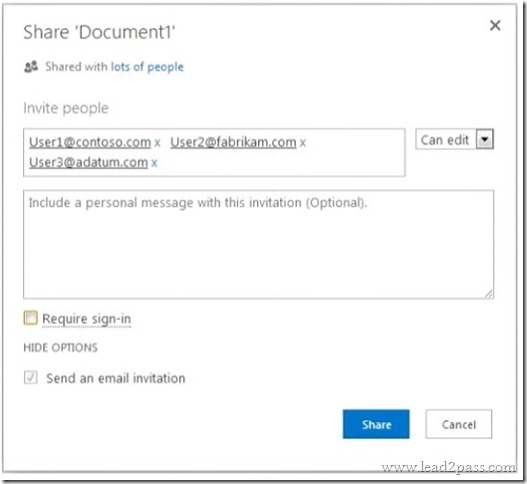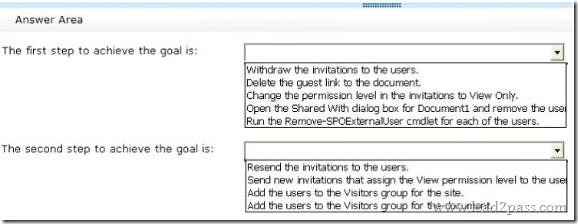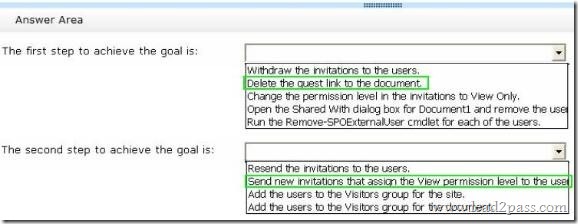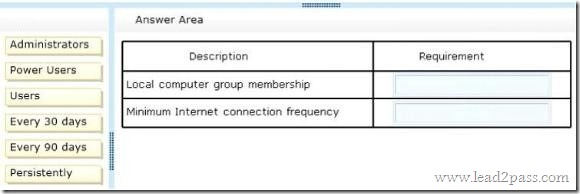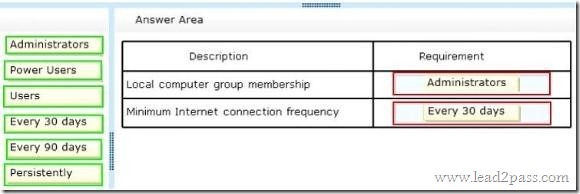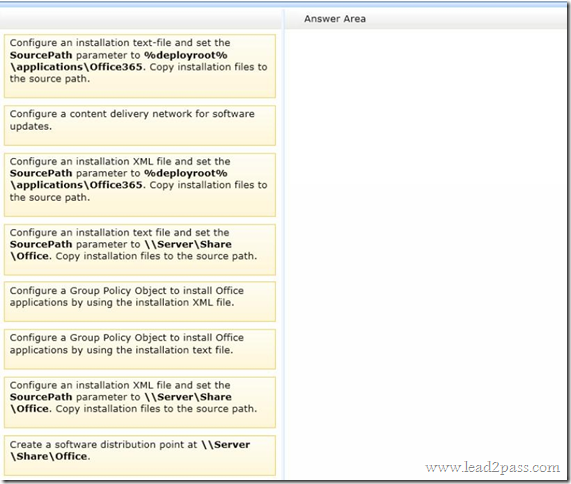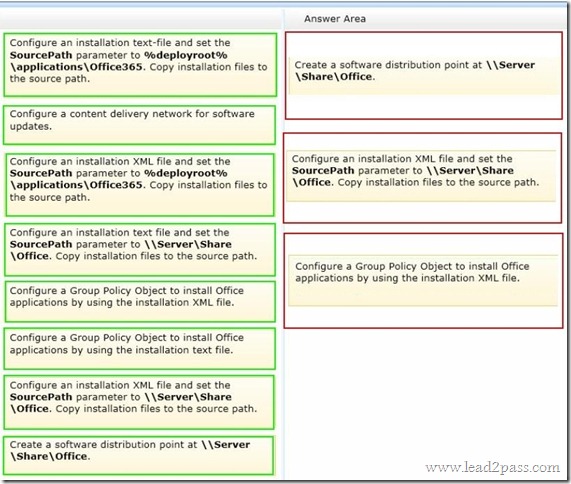Lead2pass Offering New 70-347 Exam PDF And 70-347 Exam VCE Dumps For Free Downloading:
https://www.lead2pass.com/70-347.html
QUESTION 61
Drag and Drop Question
You are the Office 365 administrator for your company.
The company has multiple Microsoft SharePoint Online sites that are shared with external users. Individual documents have also been shared from other Microsoft SharePoint Online sites.
The company recently ended collaboration with a vendor named Contoso, Ltd.
You need to revoke all sharing with external users who log in with contoso.com accounts without affecting sharing with other vendors.
Which three actions should you perform in sequence? To answer, move the appropriate actions from the list of actions to the answer area and arrange them in the correct order.
Answer:
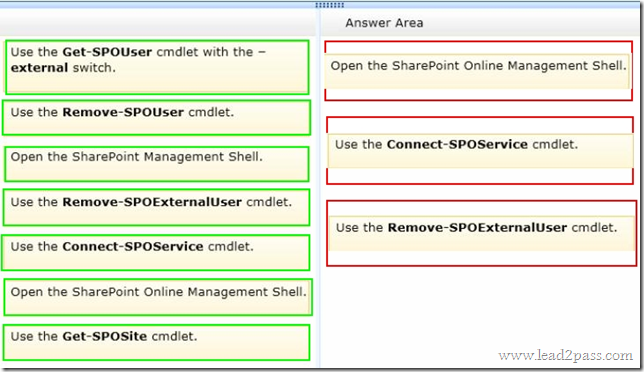
Explanation:
Contoso users have access to multiple shared files and multiple shared sites throughout the SharePoint site structure.
The easiest way to remove Contoso users’ access to all the shared resources is to remove the Contoso users at the top level of the SharePoint structure, the Tenant.
The Remove-SPOExternalUser PowerShell cmdlet is used to remove a collection of external users from the tenancy’s folder.
To run the Remove-SPOExternalUser cmdlet, we first need to open the SharePoint Online management Shell (Step 1) and connect to the SharePoint Online tenant by running the Connect-SPOService cmdlet (Step 2). We can then run the Remove-SPOExternalUser cmdlet as in Step 3.
https://technet.microsoft.com/en-gb/library/jj730437.aspx
QUESTION 62
Hotspot Question
Your company uses Microsoft SharePoint Online.
You share a file named Document1 with several users, as shown in the image below.
You need to ensure that the users can display, but not change, Document1.
What should you do? Select the correct answer from each list based on the information presented in the image. Each correct selection is worth one point.
Answer:
QUESTION 63
You are the Office 365 administrator for your company.
All users have been assigned E3 licenses and use Office Web Apps to create and edit documents.
A user attempts to access documents stored on a USB flash drive.
When the user double- clicks a file that is stored on the USB flash drive, an error message states that Windows can’t open the file and needs to know what program to use to open it.
You need to ensure that the user can start Office applications and edit Office documents by double-clicking files.
What should you do on the user’s computer?
A. Use Office on Demand.
B. Install Office 365 ProPlus from the Office 365 portal.
C. Copy the files from the USB flash drive to the local hard drive.
D. Install and configure Microsoft Word Viewer.
Answer: B
Explanation:
You can deploy Office 365 ProPlus in your organization by allowing users to install Office 365 ProPlus directly from the Office 365 portal, or by downloading the Office 365 ProPlus software to the local network and then deploying it to your users.
Incorrect Answers:
A: Office on Demand is a feature available to subscribers of Office 2013, not Office 365.
C: Copying the files from the USB flash drive to the local hard drive will still produce the same result, as there are no Office applications installed.
D: Microsoft Word Viewer allows you to view, print and copy Word documents. It does not allow for editing of word documents.
https://technet.microsoft.com/en-us/library/gg998766.aspx
http://blogs.office.com/2012/08/27/click-to-run-and-office-on-demand/
https://www.microsoft.com/en-za/download/details.aspx?id=4
QUESTION 64
You are the Office 365 administrator for your company.
Executive employees have been assigned E3 licenses.
Non-executive employees have been assigned El licenses.
An employee who is not on the executive team wants to communicate with executive team members by using Microsoft Lync instant messaging.
You need to ensure that the employee can use Lync.
What should you do?
A. Sign in to the Office 365 portal and use Office on Demand.
B. Sign in to the Office 365 portal and then run the Office 365 Desktop Setup.
C. Sign in to the Office 365 portal and then download and install Office 365 ProPlus.
D. Sign in to the Office 365 portal and then download and install the Lync Basic desktop client.
Answer: D
Explanation:
The E1 plan doesn’t include an Office client so we must download and install the Lync Basic Desktop client.
https://blog.blksthl.com/2015/06/16/office-365-feature-comparison-chart-all-plans/
QUESTION 65
Drag and Drop Question
Your company uses Office 365.
You are planning a user-driven deployment of Office 365 ProPlus.
You need to provide users with the minimum requirements for running Office 365 ProPlus.
Which requirements should you provide? To answer, drag the appropriate requirements to the correct targets. Each requirement may be used once, more than once, or not at all.
You may need to drag the split bar between panes or scroll to view content.
Answer:
Explanation:
For users to have the ability to install Office 365 ProPlus on their computers, they must be configured as local administrators. Furthermore, users don’t have to be connected to the Internet all the time to use Office 365 ProPlus. They do, however, have to connect every 30 days to prevent Office 365 ProPlus from going into reduced functionality mode.
Incorrect Answers:
Members of the Power Users group can create user accounts and then modify and delete the accounts they have created. This exceeds the requirements for running Office 365 ProPlus.
Members of the Users group can perform common tasks, which does not include installing Office 365 ProPlus. This does not meet the requirements for running Office 365 ProPlus.
Connecting every 90 days will allow Office 365 ProPlus to go into reduced functionality mode.
Persistent connectivity is allowed, but it is not a minimum requirement.
https://technet.microsoft.com/en-us/library/gg998766.aspx
https://technet.microsoft.com/en-us/library/cc785098(v=ws.10).aspx
QUESTION 66
Drag and Drop Question
You are the Office 365 administrator for your company.
The company is deploying Office 365 ProPlus.
The company has the following deployment requirements:
– Office applications must be installed from a local network location by using a self- service model.
– Office application updates must not be deployed until they have been tested for compatibility.
– The installation of Office applications and updates must occur without user interaction.
You need to deploy Office 365 ProPlus.
Which three actions should you perform in sequence? To answer, move the appropriate actions from the list of actions to the answer area and arrange them in the correct order.
Answer:
Explanation:
A new build of Office 365 ProPlus is released to the Microsoft Content Delivery Network (CDN) every 2nd Tuesday of every month. You would therefore need to configure a content delivery network.
You can configure Office 365 ProPlus to get updates automatically from a location on your network, i.e. distribution point, using the Office Deployment Tool or Group Policy. This is a good option if you want to test to make sure that your line-of-business applications work with the new version.
The Office Deployment Tool makes use of a Configuration.xml file, which includes the instructions for what Office software to download from Office 365.
http://blogs.technet.com/b/office_resource_kit/archive/2014/01/28/managing-updates-for-office-365-proplus-part-2.aspx
https://technet.microsoft.com/en-us/library/cc179070.aspx#BKMK_RunSetupFromLIS
https://support.office.com/en-us/article/Content-delivery-networks-0140f704-6614-49bb-aa6c-89b75dcd7f1f?ui=en-US&rs=en-US&ad=US
QUESTION 67
You subscribe to Office 365.
You plan to implement single sign-on.
You need to deploy Active Directory Federation Services (AD FS) to a server for the planned implementation.
Which deployment methods should you use? (Each correct answer presents a complete solution. Choose all that apply.)
A. On a server that runs Windows Server 2008 R2, download and install AD FS 2.0.
B. On a server that runs Windows Server 2008, download and install AD FS 2.0.
C. On a server that runs Windows Server 2008, install the AD FS server role.
D. On a server that runs Windows Server 2008 R2, install the AD FS server role.
Answer: AB
Explanation:
AD FS has a separate installation package for the Windows Server 2008, Windows Server 2008 R2 operating system platforms (and it is commonly referred to as AD FS 2.0) or it can be installed by adding the Federation Service server role as part of the Windows Server 2012 or Windows Server 2012 R2 operating system.
http://technet.microsoft.com/en-us/library/dn151311.aspx
QUESTION 68
Your company has a hybrid deployment of Office 365.
You discover that some Active Directory user accounts are unavailable in Office 365.
You need to identify why the user accounts are unavailable in Office 365.
What should you do?
A. Verify the miissetup.log file.
B. Run the Microsoft Remote Connectivity Analyzer.
C. Run the Test-OutlookWebServices cmdlet.
D. Run miisclient.exe.
Answer: D
Explanation:
In a hybrid deployment, user accounts and groups in the on-premise Active Directory are synchronized to the Azure Active Directory by using the Azure Active Directory Synchronization Tool (DirSync.exe).
When DirSync is installed on a server in the on-premise network, a utility known as the “Synchronization Service Manager” (miisclient.exe) is also installed in the “C:\Program Files\Microsoft Online Directory Sync\SYNCBUS\Synchronization Service\UIShell\” directory.
This “Synchronization Service Manager” can help you with managing MS DirSync especially if errors arise.
Incorrect Answers:
A: The miissetup.log file is the Microsoft Identity Information Server (MIIS) setup log file used to verify successful installation of MIIS. It is not used for troubleshooting Active Directory Synchronization problems. Therefore, this answer is incorrect.
B: Microsoft Remote Connectivity Analyzer is a website offered by Microsoft for testing remote connectivity to server services such as Exchange Server, Lync Server and Office 365. Microsoft Remote Connectivity Analyzer is not used for troubleshooting Active Directory Synchronization problems. Therefore, this answer is incorrect.
C: The Test-OutlookWebServices cmdlet is used to verify the Autodiscover service settings for Microsoft Outlook on a computer running the Microsoft Exchange Server Client Access server role. It is not used for troubleshooting Active Directory Synchronization problems. Therefore, this answer is incorrect.
http://www.codetwo.com/admins-blog/sync-premises-ad-office-365/
QUESTION 69
Your company has a hybrid deployment of Office 365.
All mailboxes are hosted on Office 365.
All users access their Office 365 mailbox by using a user account that is hosted on-premises.
You need to delete a user account and its associated mailbox.
Which tool should you use?
A. The Remove-MSOLUser cmdlet
B. The Remove-Mailbox cmdlet
C. The Office 365 portal
D. Active Directory Users and Computers
Answer: D
Explanation:
In a hybrid deployment of Office 365, the user accounts in the on-premise Active Directory are replicated to the Azure Active Directory using the Azure Active Directory Sync Tool (DirSync). This enables users to access Office 365 resources such as Exchange Online mailboxes by using the on-premise Active Directory credentials.
Any changes to a user account must be performed in the on-premise Active Directory. The changes will then be replicated to Azure Active Directory.
To delete a user account and mailbox, the user account must be deleted in the on-premise Active Directory. The user account deletion will be replicated to Azure Active Directory. The Exchange Online mailbox will then be deleted.
Incorrect Answers:
A: The Remove-MSOLUser cmdlet can be used to delete a user account from Azure Active Directory. However, in a hybrid configuration, the user accounts in the on-premise Active Directory are replicated to the Azure Active Directory so the user account would be recreated at the next replication. Therefore, this answer is incorrect.
B: The Remove-Mailbox cmdlet can be used to delete a mailbox from Exchange Online and the associated user account from Azure Active Directory. However, in a hybrid configuration, the user accounts in the on-premise Active Directory are replicated to the Azure Active Directory so the user account would be recreated at the next replication. Therefore, this answer is incorrect.
C: The Office 365 portal can be used to delete a user account from Azure Active Directory. However, in a hybrid configuration, the user accounts in the on-premise Active Directory are replicated to the Azure Active Directory so the user account would be recreated at the next replication. Therefore, this answer is incorrect.
https://msdn.microsoft.com/en-us/library/azure/dn194132.aspx
https://technet.microsoft.com/en-GB/library/aa995948%28v=exchg.150%29.aspx
https://technet.microsoft.com/en-GB/library/jj200581%28v=exchg.150%29.aspx
QUESTION 70
Your company has a hybrid deployment of Office 365.
You need to create a group.
The group must have the following characteristics:
– Group properties are synchronized automatically.
– Group members have the ability to control which users can send email messages to the group.
What should you do?
A. Create a distribution group and configure the Mail Flow Settings.
B. Create a dynamic distribution group.
C. Create a new role group.
D. Create a distribution group and configure the Membership Approval settings.
Answer: A
Explanation:
A distribution group is a mail-enabled Active Directory distribution group object that can be used only to distribute messages to a group of recipients. In this question, we have a hybrid deployment. This means that the on-premise Active Directory is synchronized to the Azure Active Directory. We can create the distribution group in the on-premise Active Directory and it will replicate to Azure Active Directory.
The Mail Flow Settings can be configured to control which users can send email messages to the group. In the Mail Flow Settings tab, double-click on Mail Delivery Restrictions to open the Mail Delivery Restrictions page. On this page, there is an “Accept Messages From..” section. In this section, select the “Only senders in the following list:” option. This will give you the option to list who can send email to the distribution group.
Incorrect Answers:
B: A dynamic distribution group is a distribution group where the membership of the group is specified by rules and can change according to the rules. For example, a distribution group could be based on the membership of an Active Directory security group. A dynamic distribution group alone has no mechanism to control who can send email to the group as required in this question. Therefore, this answer is incorrect.
C: A role group is used to assign permissions in the Role Based Access Control (RBAC) model. It is not used for email distribution or for controlling who can send email to an email distribution group. Therefore, this answer is incorrect.
D: A distribution group is a mail-enabled Active Directory distribution group object that can be used only to distribute messages to a group of recipients. Membership Approval settings are used to configure the approval requirements for membership of the group. For example, you can require that anyone can join the group or that only group owners can add members to the group. However, this does not enable you to control who can send email to the group as required in this question. Therefore, this answer is incorrect.
https://technet.microsoft.com/en-us/library/bb201680%28v=exchg.150%29.aspx
http://www.msexchange.org/articles-tutorials/exchange-server-2010/management-administration/managing-distribution-groups-exchange-server-part3.html
http://exchangeserverpro.com/configuring-membership-approval-for-distribution-groups-in-exchange-server-2010/
70-347 dumps full version (PDF&VCE): https://www.lead2pass.com/70-347.html
Large amount of free 70-347 exam questions on Google Drive: https://drive.google.com/open?id=0B3Syig5i8gpDTmZ1RjZSYlV3V00
You may also need:
70-346 exam dumps: https://drive.google.com/open?id=0B3Syig5i8gpDVjBwLTI5aDNwM1k
